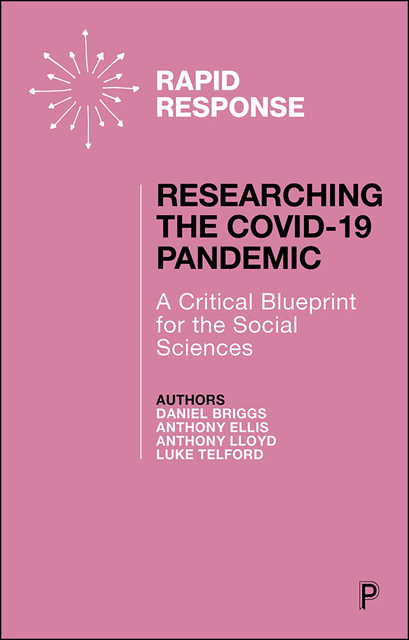Book contents
- Frontmatter
- Dedication
- Contents
- List of figures and tables
- Acknowledgements
- Foreword
- 1 Apocalypse then: The world pre-COVID-19 and the state of the social sciences
- 2 Viral Armageddon: The spread and impact of COVID-19
- 3 Apocalypse now: The (desk-based) scramble for knowledge
- 4 Studying the COVID-19 pandemic as it happens
- 5 Apocalyptic futures: An appeal to the social sciences
- Notes
- References
5 - Apocalyptic futures: An appeal to the social sciences
Published online by Cambridge University Press: 15 April 2023
- Frontmatter
- Dedication
- Contents
- List of figures and tables
- Acknowledgements
- Foreword
- 1 Apocalypse then: The world pre-COVID-19 and the state of the social sciences
- 2 Viral Armageddon: The spread and impact of COVID-19
- 3 Apocalypse now: The (desk-based) scramble for knowledge
- 4 Studying the COVID-19 pandemic as it happens
- 5 Apocalyptic futures: An appeal to the social sciences
- Notes
- References
Summary
When we reflect on COVID-19 and the lockdown restrictions enacted around the world, it is inevitable that some people will have experienced a ‘good lockdown’ in the way that some participants in the previous century's defining moments, the two world wars, spoke of enjoying a ‘good war’. Time to stop and reflect, identify priorities, learn a new skill, spend more time with family, work from home, enjoy Zoom quizzes. They will come out of this crisis financially better off, professionally secure and emotionally centred. For them, the world post-COVID-19 will likely be one of opportunity and advancement. However, the rich empirical data presented in this book show that these experiences speak to privileges not afforded to all. The world into which COVID-19 emerged was one of heightened inequality, increasing polarisation and tension, and a growing post-social arrangement whereby the challenge of social cohesion was fraught with difficulty. The pandemic has exacerbated many of these tensions and created new ones. New social divisions appear, and new fault lines represent challenges that will define the coming era. Social inequalities have grown, both economically and culturally, as some elites have enjoyed unprecedented growth in wealth, the ranks of unemployed in Western economies swell with each business failure and high-street closure. Elsewhere, in poorer developing nations, the pandemic has burdened states lacking adequate healthcare provisions and with considerable numbers of citizens that rely on the informal economy for work.
New global contours are emerging and the fundamental building blocks at the heart of social science are now questioned anew: how does the pandemic affect the relationship between individuals and society? What do new inequalities and fault lines mean for social cohesion? Will the pandemic usher in new configurations of social control? Rather than provide a summary of the main points made so far, this chapter will aim to draw together the threads of our argument to look towards the future, both for society and for the social sciences. We feel it is important to start asking the right questions and be willing to look for those answers.
- Type
- Chapter
- Information
- Researching the COVID-19 PandemicA Critical Blueprint for the Social Sciences, pp. 107 - 124Publisher: Bristol University PressFirst published in: 2023



